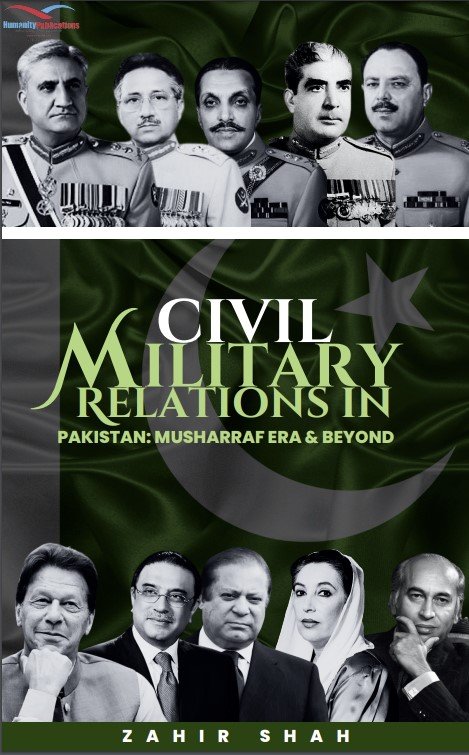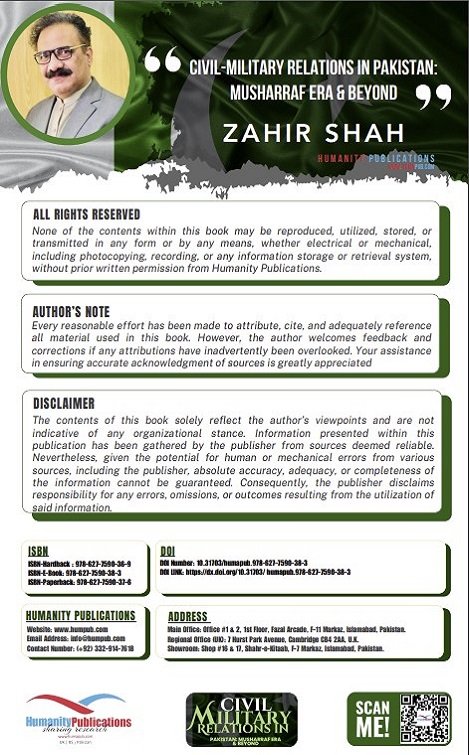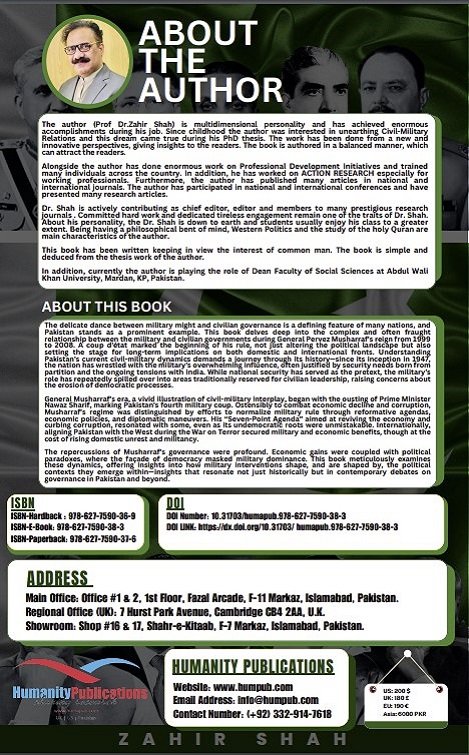Civil Military Relations in Pakistan
-
Author
Zahir Shah, Professor, Department of Political Science, Abdul Wali Khan University Mardan -
Author's Email
or books@humapub.com
Monday to Friday 9am - 7pm -
Publisher Contact
info@humapub.com - +92-332-914-7618
Monday to Sunday 24 Hours
The author (Prof Dr.Zahir Shah) is multidimensional personality and has achieved enormous accomplishments during his job. Since childhood the author was interested in unearthing Civil-Military Relations and this dream came true during his PhD thesis. The work has been done from a new and innovative perspectives, giving insights to the readers. The book is authored in a balanced manner, which can attract the readers. Alongside the author has done enormous work on Professional Development Initiatives and trained many individuals across the country. In addition, he has worked on ACTION RESEARCH especially for working professionals. Furthermore, the author has published many articles in national and international journals. The author has participated in national and international conferences and have presented many research articles. Dr. Shah is actively contributing as chief editor, editor and members to many prestigious research journals . Committed hard work and dedicated tireless engagement remain one of the traits of Dr. Shah. About his personality, the Dr. Shah is down to earth and students usually enjoy his class to a greater extent. Being having a philosophical bent of mind, Western Politics and the study of the holy Quran are main characteristics of the author. This book has been written keeping in view the interest of common man. The book is simple and deduced from the thesis work of the author. In addition, currently the author is playing the role of Dean Faculty of Social Sciences at Abdul Wali Khan University, Mardan, KP, Pakistan.
The interaction between military power and civil authority plays a crucial role in the political dynamics of many nations, particularly in countries such as Pakistan. The military has significantly influenced the political landscape in Pakistan, and this book focuses on exploring the intricate and sometimes turbulent relationship between the military and civilian governments during the era of General Pervez Musharraf from 1999 to 2008. This period is notable not only for the dramatic coup that brought Musharraf to power but also for its substantial implications on the future course of Pakistan’s domestic and international politics. Understanding the current dynamics of civil-military relations in Pakistan necessitates taking into account the historical context that has shaped these interactions over the years. Since its establishment in 1947, Pakistan has grappled with a strained relationship between civilian institutions and military leadership. The military has taken control of the state’s administration on several occasions, each leaving a distinct mark on the country’s political and social landscape. The foundation of such a formidable military establishment can be traced back to the partition of British India, which resulted in the creation of Pakistan as a fledgling state facing intricate security challenges, including contentious borders with its larger neighbor, India. The strategic necessities of national security have ostensibly validated the prominent role of the military in state governance. However, this involvement has often surpassed traditional defense roles, extending into domains typically under civilian government purview. The military’s engagement in politics is frequently justified by perceived threats to national stability or inefficiencies and corruption within civilian administrations. While this reasoning may provide temporary stability, it has raised significant questions about the long-term impact on democratic processes and civil governance.
Table of Contents
Preface
Foreword
Acknowledgement
Copyrights
Disclaimer
Abstract:
The purpose of this research was to analyse the relationship development and communication competence of MPhil/PhD supervisors. A confirmatory mixed-methods research design was used to conduct the study in two stages. For both phases, 360 MPhil/PhD graduates and 72 supervisors were selected from four public universities in Punjab using a multistage sampling technique. Data were collected electr... read more
PDF Full Text Views (19405)Abstract:
Muslim scholars have contributed enormously to the concept of welfare State. Among them Shah Waliullah is the rising sun who was born in South Asian sub-continent in the 19th century. He was holding the firsthand knowledge of Quran and Hadiths, the first primary sources in Islam. Shah Waliullah's point of view regarding welfare state occupies central theme in his works. His basic concepts like ... read more
PDF Full Text Views (19066)Abstract:
The paper critically evaluates the notion that political Islam is a threat to world peace. The argument is developed in the light of Islamic history and fundamentals of Islam and the research is based on primary and secondary sources. There was a time when magical influence of Muslims in every field of life (socio-economic, Political scientific) was conspicuous. For instance, Al Farabi's books ... read more
PDF Full Text Views (11855)Abstract:
This study aims at exploring and examining the causes of teacher's favoritism and its effects on the university students. Quantitative tools are applied to collect data for the study and to check its reliability. The results of the data reveal that the teachers favor the students on the basis of gender, race, area, similar political ideology and family/blood relation. The study also indicates t... read more
PDF Full Text Views (10075)Abstract:
This was proposed to investigate the effect of self-regulated learning strategies on students’ motivation for learning English. This was an experimental research. Intact group pretest and posttest of design was utilized for data collection. Intact groups (experimental and control) of student studying in eighth class were selected voluntarily. Experimental group was taught with SRL strateg... read more
PDF Full Text Views (8863)Abstract:
The current study investigates the prevalent gender-binary narrative in Pakistani television commercials. It tends to portray the dominant gender representational mechanisms which are implicitly employed by the advertisers. Television commercials, having the power to (re)frame the ideology of larger audience through visual/linguistic content and agency to pave the way for social change have bec... read more
PDF Full Text Views (7768)Abstract:
This paper investigates the issues and challenges encountered by students obtaining distance education in Pakistan. We conducted interviews with students obtaining distance education and they were enrolled in different study programs. Qualitative interviews were conducted to understand the perception of the study participants regarding the issues and challenges faced by them in learning. Studen... read more
PDF Full Text Views (7292)Abstract:
The study explores the effectiveness of integrated and traditional instruction method in developing reading and writing skills in Urdu language at primary level. As an experimental study it used Pretest, post-test and control group design in finding these effects. The researcher developed integrated instruction model for Urdu language by combining contents of Urdu and Islamic Studies by adoptin... read more
PDF Full Text Views (6820)Abstract:
This article will examine the idea of new states/provinces in India. How India created 16 new states on ethno-lingual, and other lines and accommodate the ethnic groups. The case study of India is focussing on the different factors; including constitutional setup and role of different political parties of India in making of the new state. The following three basic questions investigate the pape... read more
PDF Full Text Views (6707)Abstract:
The base of a successful university in providing quality education and practical knowledge for improving the lives of the youths in terms of social, economical and intellectual development are only possible through promoting research culture. Research conduct and writing is the most important tool for identifying remedial recommendations for education and related problems. This research present... read more
PDF Full Text Views (6441)Abstract:
Muslim scholars have contributed enormously to the concept of welfare State. Among them Shah Waliullah is the rising sun who was born in South Asian sub-continent in the 19th century. He was holding the firsthand knowledge of Quran and Hadiths, the first primary sources in Islam. Shah Waliullah's point of view regarding welfare state occupies central theme in his works. His basic concepts like ... read more
PDF Full Text Downloads (157)Abstract:
The present study means to investigate Hamlet in the light of postmodernist-Deconstructive theoretical framework. The play seems to reinforce the overarching dominant patriarchal meta-narrative, with supposed unitary voice and unified identities. The current reading means to show that the play is a metaphor of postmodernism with pluralistic subjectivities, multiple alternative micronarrative vo... read more
PDF Full Text Downloads (93)Abstract:
This study aims at exploring and examining the causes of teacher's favoritism and its effects on the university students. Quantitative tools are applied to collect data for the study and to check its reliability. The results of the data reveal that the teachers favor the students on the basis of gender, race, area, similar political ideology and family/blood relation. The study also indicates t... read more
PDF Full Text Downloads (81)Abstract:
The study explores the effectiveness of integrated and traditional instruction method in developing reading and writing skills in Urdu language at primary level. As an experimental study it used Pretest, post-test and control group design in finding these effects. The researcher developed integrated instruction model for Urdu language by combining contents of Urdu and Islamic Studies by adoptin... read more
PDF Full Text Downloads (75)Abstract:
This study examines the persuasive strategies of Imran Khan's political discourse. It also highlights the covert ideological practices as they are embedded in his political speeches. The analysis is based on the theoretical perspective of Fairclough and Van Dijk. This study analyses the linguistic elements and contextual facets to find hidden ideologies. The findings suggest Khan use of multipl... read more
PDF Full Text Downloads (51)Abstract:
Language is product of four skills: reading, writing, listening and speaking. English language learning and examination has been reduced to reading and writing in Pakistan, at the University level. However, English Speaking Skills (ESS) are in high demand in professional life. ESS require testing and grading like English writing skills. This study is based on developing ESS through testing crit... read more
PDF Full Text Downloads (41)Abstract:
The Servant Leader Model is a theory that advances administration, supports trust, coordinates effort, future-arranges and utilizes moral capacity to engage others, focusing on good ethical practices. This study inspects the faculty of public and private universities in Peshawar for elements of servant leader behavior (wisdom, emotional healing and persuasive mapping) and effect on performance.... read more
PDF Full Text Downloads (41)Abstract:
The paper compares the coverage of JNK conflict in the Pakistani and Indian English press. The objective of the study is to figure out the differences in the coverage of Kashmir conflict by the Indian and Pakistani press along with determining the prominence of war or peace frames in the coverage. Content Analysis was carried out of the news stories published on the international and national p... read more
PDF Full Text Downloads (39)Abstract:
This study inquires into the intricacies of the human mind, as portrayed through the character of Piggy in William Golding’s Lord of the Flies. For an in depth analysis, the theoretical framework of Ghazali (1058-1111) and Freud (1856-1939) is used. The study has adapted Attride Sterling’s (2001) model of textual data analysis. This analysis, inside the parameters of the selected th... read more
PDF Full Text Downloads (38)Abstract:
This research analyzes the soft power and cultural diplomacy of the Kingdom of Saudi Arabia. Over the years, the Kingdom has been using its cultural diplomacy as an instrument of foreign policy for the promotion of its soft power at regional and global level. The analysis suggest the use of soft power and cultural diplomacy are part of Kingdom’s foreign policy, bringing a wider gesture of... read more
PDF Full Text Downloads (37)

